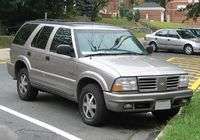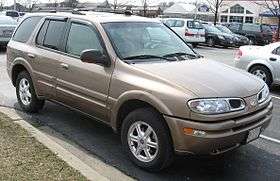Oldsmobile Bravada
| Oldsmobile Bravada | |
|---|---|
 | |
| Overview | |
| Manufacturer | Oldsmobile (General Motors) |
| Production |
1991–1994 1996–2004 |
| Assembly | Moraine, Ohio, United States |
| Body and chassis | |
| Class | Mid-size luxury SUV |
| Body style | 4-door SUV |
| Powertrain | |
| Transmission | 4-speed automatic |
| Chronology | |
| Successor |
Buick Rainier Saab 9-7X |
The Oldsmobile Bravada is a mid-size SUV made by Oldsmobile. Two different vehicles bore the Bravada name: The first and second-generation models built on the GMT330 platform, and the third generation 2002 to 2004 on the GMT360. The third generation was the only version offered in Canada.
Introduced for the 1991 model year, the Bravada was GM's first foray into the mid-size SUV class, and would become the only SUV model ever produced by Oldsmobile.
First generation (1991–1994)
| First generation | |
|---|---|
 | |
| Overview | |
| Production | 1991–1994 |
| Body and chassis | |
| Body style | 4-door SUV |
| Layout | All Wheel Drive |
| Platform | GM GMT330 platform |
| Related |
Chevrolet S-Blazer/GMC Jimmy Chevrolet S-10/GMC Sonoma GMC Typhoon/Syclone |
| Powertrain | |
| Engine | 4.3 L Vortec 4300 V6 |
| Dimensions | |
| Wheelbase | 107.0 in (2,718 mm) |
| Length | 178.9 in (4,544 mm) |
| Width | 65.2 in (1,656 mm) |
| Height | 65.5 in (1,664 mm) |
The 1991 Bravada was an upscale version of the then-new 4-door S-Blazer/Jimmy. It was the first truck-based vehicle offered by Oldsmobile since the 1920s, and at that time was a United States-only vehicle. Unlike its siblings, the Bravada was only offered with "Smart Trak" all-wheel drive, power equipment, body-colored bumpers and exterior trim, and the 4.3 L W-code engine. At the heart of Smart Trak system was the Borg Warner 4472 transfer case (also shared with the AWD GM M platform vans (Astro/Safari)), offering 65% rear and 35% front torque with more to the front when it slips. Anti-lock brakes and remote keyless entry were also standard.

The 4.3 L V6 engine got a horsepower boost to 200 for 1992. Also for '92, the Bravada's instrument panel was slightly modified to differ from its siblings. 1993 saw the addition of an overhead console with compass, temperature, and reading lights. An optional Gold package with gold exterior badging and special gold aluminum wheels was also new for '93. This version was produced through 1994.
Engines
- 1991 - 4.3 L LB4 V6, TBI, 160 hp (119 kW)/230 lb·ft (312 N·m) (VIN Z)
- 1992–1994 - 4.3 L L35 Vortec 4300 V6, CPFI, 200 hp (149 kW) (VIN W)
Fuel economy
The first generation Bravada with the 160 hp engine averaged United States Environmental Protection Agency city/highway 17 miles per US gallon (14 L/100 km; 20 mpg-imp)/22 miles per US gallon (11 L/100 km; 26 mpg-imp). The second generation with the 200 hp engine averaged 16 miles per US gallon (15 L/100 km; 19 mpg-imp)/21 miles per US gallon (11 L/100 km; 25 mpg-imp).
Second generation (1996–2001)
| Second generation | |
|---|---|
 | |
| Overview | |
| Production | 1996–2001 |
| Body and chassis | |
| Body style | 4-door SUV |
| Layout | All Wheel Drive |
| Platform | GM GMT330 platform |
| Related |
Chevrolet Blazer/GMC Jimmy Chevrolet S-10/GMC Sonoma Isuzu Hombre |
| Powertrain | |
| Engine | 4.3 L Vortec 4300 V6 |
| Dimensions | |
| Wheelbase | 107.0 in (2,718 mm) |
| Length |
1996–97: 180.9 in (4,595 mm) 1998–2001: 183.7 in (4,666 mm) |
| Width |
1996–97: 66.5 in (1,689 mm) 1998–99: 67.6 in (1,717 mm) 2000–01: 67.8 in (1,722 mm) |
| Height |
1996–99: 63.2 in (1,605 mm) 2000–01: 64.4 in (1,636 mm) |
The Bravada was refreshed later than its platform mates, with no 1995 models produced. The 1996 and 1997 models' body featured more rounded lines than their predecessor. This generation Bravada could easily be distinguished from the Chevrolet Blazer and GMC Jimmy by its Oldsmobile-styled body-colored split grille, premium alloy wheels, and lower bodyside cladding. Standard fare including a driver's airbag and daytime running lamps. The interior styling was more appealing to the eye with less ridges and squares, much like the exterior. In keeping with its premium image, the Bravada's interior was modified and upgraded, to differ from its Chevrolet/GMC siblings. The front bucket seats were similar to those found on the Aurora. Other interior features included standard leather seating, woodgrain trim, and its unique center console with a leather-wrapped console shifter (as opposed to a column shifter on the Blazer/Jimmy). In 1997, 4-wheel anti-lock disc brakes became standard and the rear spoiler was deleted. As with the previous generation, the Oldsmobile Bravada was available only in 4-door, 5-passenger configuration.
1998

Another refreshening occurred in 1998. The "Smart Trak" system now featured the computer controlled NP-136 transfer case, which works more like a traction control. The Bravada was now run RWD in normal operations and only when wheel slip is detected does the "Smart Trak" kick into AWD. A revised interior including dual airbags, heated seats, and a new front fascia which included the new Aurora inspired Oldsmobile logo. OnStar was available in 1999 as a cell phone unit, later becoming integrated into the rearview mirror in 2001 with available features like hands-free calling and virtual advisor. A Bose sound system was added for 1999 and the fuel injection was updated in 2000, though output remained the same. A new two-tone exterior dubbed the Platinum Edition was made available in 2000. This generation was phased out in 2001 to make way for the new GMT360 Bravada.
Engines
- 1996–2001 - 4.3 L L35 Vortec 4300 V6, SCPI, 191 hp (142 kW) with single exhaust
Fuel economy
The second generation Bravada EPA city/highway averaged 16 miles per US gallon (15 L/100 km; 19 mpg-imp)/21 miles per US gallon (11 L/100 km; 25 mpg-imp).
Third generation (2002–2004)
| Third generation | |
|---|---|
 | |
| Overview | |
| Production | 2002–2004 |
| Body and chassis | |
| Body style | 4-door SUV |
| Layout | Rear-wheel drive/All Wheel Drive |
| Platform | GMT360 |
| Related |
Chevrolet SSR Chevrolet TrailBlazer GMC Envoy Buick Rainier Isuzu Ascender Saab 9-7X |
| Powertrain | |
| Engine | 4.2 L Vortec I6 |
| Dimensions | |
| Wheelbase | 113.0 in (2,870 mm) |
| Length | 191.8 in (4,872 mm) |
| Width | 75.4 in (1,915 mm) |
| Height | 74.5 in (1,892 mm) |
The new 2002 Bravada hit showrooms in February 2001.[1] The third generation Bravada holds the distinction of being both the first GMT360 truck introduced, as well as the last new Oldsmobile model. Like the Chevrolet TrailBlazer and GMC Envoy, it used the new 270 hp (201 kW) Atlas I6 engine. Rear-wheel drive was available for the first time as well, making this the first rear wheel drive Oldsmobile since the 1992 Custom Cruiser. The Bravada entered Canada at this time. This was the first Oldsmobile with a straight-6 engine since the Omega of 1978, and the only GMT360 not to offer a V8 engine option.
Production of the Bravada ended with the demise of the Oldsmobile marque in 2004. The last 500 Bravadas were produced as "Final 500" special editions, each featuring custom seat embroidering and exterior badging inspired by vintage Oldsmobile logos, dark cherry metallic paint, unique chrome alloy wheels, and a medallion featuring that particular Bravada's production number, ranging from 1 to 500.
The last Bravada, the number 500, rolled off the assembly line on January 12, 2004. The closing of the last factory that manufactured the trucks was the subject of an emotional 2009 HBO documentary - “The Last Truck: Closing of a G.M. Plant”.[2]
The Bravada bodyshell was continued by its joint replacements, the 2004-2007 Buick Rainier and the 2005-2009 Saab 9-7X - the latter of which remained in production until December 2008.
Engines
Fuel economy
The third generation Bravada EPA city/highway averaged 15 miles per US gallon (16 L/100 km; 18 mpg-imp)/21 miles per US gallon (11 L/100 km; 25 mpg-imp).
References
- ↑ "New Cars for 2002". Automobile Magazine (September 2001).
- ↑ The Days the Plant Died
| Wikimedia Commons has media related to Oldsmobile Bravada. |
| |||||||||||||||||||||||||||
| « previous — Oldsmobile road car timeline, 1980s–2004 | |||||||||||||||||||||||||
|---|---|---|---|---|---|---|---|---|---|---|---|---|---|---|---|---|---|---|---|---|---|---|---|---|---|
| Type | 1980s | 1990s | 2000s | ||||||||||||||||||||||
| 0 | 1 | 2 | 3 | 4 | 5 | 6 | 7 | 8 | 9 | 0 | 1 | 2 | 3 | 4 | 5 | 6 | 7 | 8 | 9 | 0 | 1 | 2 | 3 | 4 | |
| Compact car | Starfire | Firenza | |||||||||||||||||||||||
| Omega | Cutlass Calais | Achieva | Alero | ||||||||||||||||||||||
| Mid-size car | Cutlass | Cutlass Ciera | Cutlass | ||||||||||||||||||||||
| Cutlass Supreme | Cutlass Supreme | Intrigue | |||||||||||||||||||||||
| Mid-size station wagon | Cutlass Cruiser | Cutlass Ciera Cruiser | |||||||||||||||||||||||
| Full-size car | Eighty-Eight | Eighty-Eight | Eighty-Eight | ||||||||||||||||||||||
| LSS | |||||||||||||||||||||||||
| Ninety-Eight | Ninety-Eight | Ninety-Eight | Regency | ||||||||||||||||||||||
| Aurora | Aurora | ||||||||||||||||||||||||
| Full-size station wagon | Custom Cruiser | Custom Cruiser | |||||||||||||||||||||||
| Personal luxury car | Toronado | Toronado | |||||||||||||||||||||||
| Minivan | Silhouette | Silhouette | |||||||||||||||||||||||
| SUV | Bravada | Bravada | Bravada | ||||||||||||||||||||||
